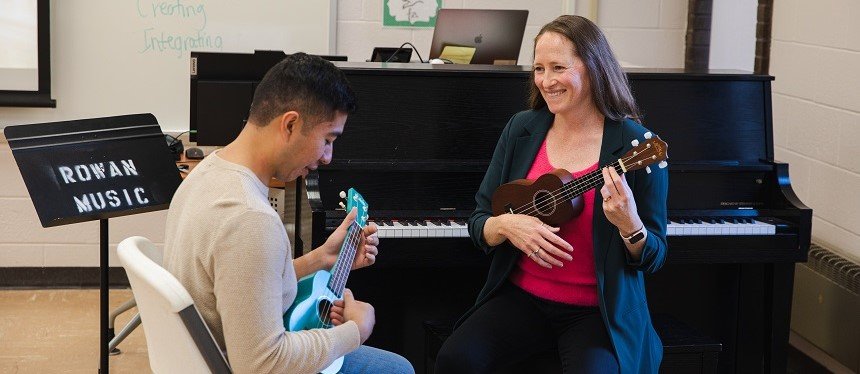Graduate Programs
Graduate Programs
College of Performing Arts Graduate Programs
Interested in continuing your Performing Arts education at Rowan? Enroll in one of our graduate degree programs through Rowan Global.Master of Arts, Arts Administration
The M.A. Arts Administration’s practically-driven curriculum provides a pathway for recent graduates and working professionals to become leaders and change markers in the performing and visual arts. Students will take courses in leadership, marketing, audience development, community outreach, entrepreneurship and more
Master of Music
Providing an intensive experience in performance, conducting or composition, Rowan’s Master of Music program enhances student knowledge and understanding of music in general. Ideal for aspiring musicians who plan to make a career as a musician, performer, conductor or composer or those who plan to continue their studies at the Ph.D level.
Master of Music Education
This program is designed for music educators to refine and advance their philosophical approaches to teaching music in a culturally diverse and technologically advanced society. With an emphasis on diversity, equity, inclusion and access, Rowan’s M.M.Ed program will prepare educators to engage in responsive teaching and connect theory to practice. By taking courses in philosophy, curricular innovation, research and various aspects of musicianship, students will explore current trends in the music education field and hone their skills as musicians and educators.
Post-Baccalaureate Certificate, Music Therapy
Intended for those who have completed an undergraduate music degree the Post-Bac Certificate prepares students to become a Board-Certified Music Therapist. The hybrid program consists of online/asynchronous coursework and face-to-face meetings throughout the semester and a Residency in Music Therapy capstone course.
Music Educators Summer Workshops 2024
Bringing Jazz Into the Classroom - June 2024
Bringing Jazz into the Classroom: A Blueprint for the Non-Jazzer
June 24-28, 2024 | 12:30-5:30PM | Wilson Hall Rm 107
Instructor: Skipp Spratt
This course is designed for the “non-jazzer” with a desire to better understand and utilize jazz pedagogy in any educational setting. Elements such as jazz interpretation and improvisation as well as how to teach these concepts in the classroom will be of primary focus. Using proven and reputable jazz resources, participants will learn the basics of improvisation as well as the theoretical elements such as modal improvisation, 12 bar blues, pattern playing and stylistic considerations. Participants may rehearse and perform on their primary instrument or instrument of choice. No previous jazz or improvisational experience is required.
About the instructor:
Norman “Skip” Spratt is a saxophonist and woodwind specialist who has performed with Natalie Cole, Tony Bennett, Johnny Mathis, Frank Sinatra Jr., Aretha Franklin, Tommy Tune, Ben Vereen, Joel Gray, The Ocean City Pops, and others. He has been a featured soloist with jazz greats Randy Brecker, Bill Watrous, and John Faddis as well as performing with The Berks Jazz Festival Big Band. Skip has recorded jingles for KYW Radio, WPVI Channel 6, Bally’s Park Place, and TV shows in Montreal, Puerto Rico, Philadelphia and AC. Skip has published many artist interviews and educational masterclasses in Saxophone Journal for Dorn Publications and Saxophone Today. His website SaxShed.com provides a service to saxophonists worldwide. Mr. Spratt is currently on faculty at Rowan University, Stockton University, and LaSalle College High School following a rewarding career as a Director of Instrumental Music at Berlin Community School. He holds a (BM) with honors in Jazz Saxophone and an (MAT) in Music Education from The University of the Arts.
Engaging Movement in General Music - July 2024
Engaging Movement in General Music: Thinking Outside the Box
July 8-12, 2024 | 12:30-5:30PM | Wilson Hall Rm 107
Movement is integral to true understanding in music, helping students better comprehend multiple music concepts. Movement also lends to a sense of community and belonging, assisting teachers with many overarching cultural sensitivity and social/emotional goals. Besides looking at a sequential framework for approaching movement from Pre-K through Middle School, you’ll learn why movement (including folk dancing) is crucial in the general music classroom. Lastly, but crucially, we will discuss how to boldly and joyfully include all genres of music, including Pop, Global, Classical, and Hip Hop, to help meet students where they are and draw them into this important (and fun!) component of being musical.
About the Instructor:
Missy Strong has taught general, choral, and instrumental music at the early childhood, elementary, and middle school levels for 28 years and is the host and Executive Producer of the Music Ed Amplified podcast and recently received the 2023 Master Music Teacher Award from the New Jersey Music Educators Association. Missy holds a Master of Music Education degree from Rowan University and a Doctor of Musical Arts degree in Music Education with a specialty in Early Childhood Musical Development from Rutgers University, New Brunswick. She currently teaches elementary general and choral music in Mount Laurel Township, NJ and is adjunct professor at Rowan University. She served as the Senior Research Assistant for Music Together and was the Director of Children’s Music Education at Philadelphia’s historic Tenth Presbyterian Church for over a decade. A frequent music education consultant and clinician, Missy presents conference sessions, professional development workshops, webinars, and courses at the collegiate, international, regional, state, and local levels. She is a published author and editor with articles in both state and national music education journals and books from GIA Publications and Oxford University Press, including a chapter in an upcoming book about SEL in the Elementary General Music Classroom.
